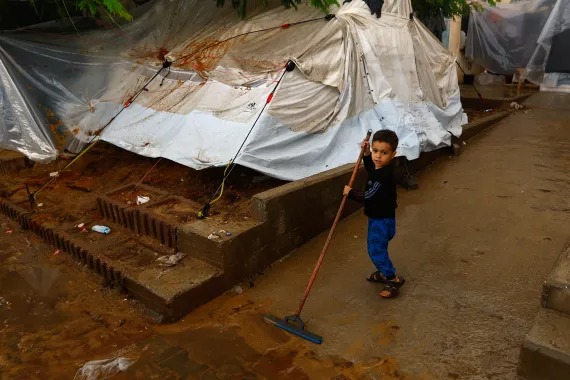In Gaza Strip, a dire humanitarian crisis is unfolding as diseases run rampant amidst a severe water and sewage emergency, raising fears of a potential cholera outbreak. As the Israeli conflict continues to devastate the region, 2.3 million residents face an alarming scarcity of drinkable water and a collapse of sanitation services. The consequences are dire, with gastrointestinal illnesses, respiratory infections, and skin diseases surging, prompting urgent calls for humanitarian aid.
Unprecedented Health Threats Amid Water Scarcity
The United Nations relief agency for Palestinian refugees (UNRWA) reports a staggering rise in gastrointestinal diseases, respiratory infections, and skin ailments, including scabies. With sewage flowing in the streets and all vital sanitation services halted, the risk of a major health crisis looms large. The World Health Organization (WHO) has documented over 44,000 cases of diarrhoea and 70,000 acute respiratory infections, but the real toll is believed to be much higher.
Water Infrastructure in Ruins: A Race Against Time
Gaza’s essential water and sanitation infrastructure lay in ruins, either destroyed by Israeli bombardment or crippled by a lack of fuel. In the southern governorates, all 76 water wells, two main drinking water plants, and 15 sewage pumping stations have ceased functioning. The UNRWA estimates that a staggering 70 percent of Gaza’s population, including over half a million children, no longer have access to clean water. With water consumption plummeting to a mere 3 liters per person per day, well below the WHO’s recommended 7.5 liters in emergency situations, a race against time is underway to prevent further catastrophe.
Fuel as a Weapon: Paralysis of Humanitarian Aid
The plight intensifies as fuel shortages cripple essential services. Israeli authorities permitted a meager 23,000 liters of fuel into Gaza, strictly limiting its use to aid transport. However, the UNRWA contends that a daily requirement of 160,000 liters is crucial for basic humanitarian operations, including medical and water facilities. The Commissioner General, Philippe Lazzarini, denounced the use of fuel as a “weapon of war,” emphasizing its detrimental impact on delivering assistance to Palestinian communities in Gaza.
As the Gaza Strip grapples with a perfect storm of water scarcity, sewage overflow, and a paralyzed healthcare system, the region stands on the precipice of a health catastrophe.















